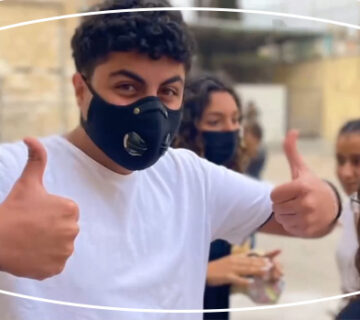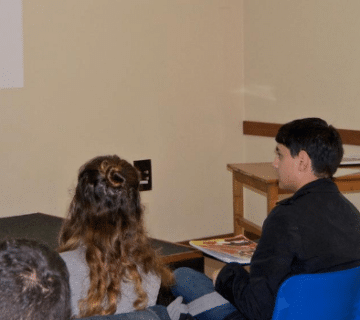“Dear A., as you can see, in our own small way, we are trying to help our companions who are in greater difficulty than we are. What we do is little, but it gives us the strength to go ahead on the road where there is the light. We sleep feeling free and with our consciences at peace. I always try to establish a dialogue with my companions; sometimes I hope I’m offering a useful word or two, at other times it is enough just to be there, at other times we say a prayer together that the Lord might help us overcome these dark moments.”
The above quote is from a letter written by a detainee to A., who every Thursday morning visits the new Rebibbia Prison compound in Rome, where his prisoner-friends are expecting him. For some years now he has been spending his day off there, taking upon himself the problems and hopes of people who, often, have touched bottom.
A. had obtained permission to meet the detainees of every sector of the prison. He is in personal contact with about 50 people and through those who are more open, he reaches out to yet others. He also helps them through the monthly Word of life and the Città Nuova magazine. Many of his friends say that they draw spiritual nourishment from these publications, as well as a different outlook, as expressed in a poem written by one of them:
“The silence of the night is like a warm welcoming bed/ (…). It is the voice of our conscience./(…) Can prisoners mend their ways / can the blind behold sunsets / can the tramps dream of a warm hearth / Can the powerful become humble and wise / and the sick smile again./ The silence of the night / is the bed on which everybody / reckons with the Truth.”
Sometimes the relationship continues even when a detainee has served his sentence or is transferred to another prison, like the author of the poem who wrote from another prison: “I’ve been in prison since 1996. Troubles, deaths in the family and then back into prison… It’s a good thing that I have learned how to love and to believe, because otherwise I don’t know how I would have ended up. I want you to know that I continue praying and that I try to bring this life of love to those who need it most. It will not be easy on the outside either: we have to reckon with our past, accept it, and humbly say: I need help. I cannot deny that in some moments I have experienced what Jesus himself experienced: abandonment, persecution, the indifference of many people… But then I tell myself: I am at fault while He was innocent. He sacrificed his life to redeem us, to make us understand to what extent we have to love. How can we help but love and adore Him?”
The experiences collected so far are a moving witness. Here are some excerpts:
“A young man in the cell across from me was desperate because he lost the ring his wife had given him as a gift. I dismantled the pipes in the sink of his cell and we found it. You wouldn’t believe how happy he was…later on I wrote a letter for an illiterate prisoner… I readily gave away a pack of 10 cigarettes even if I was left with none.”
“I worked for two months to make a boat out of toothpicks. I wanted to sell it and earn some money, but my friend had no gift to give his wife so I decided to give him my boat.”
These are glimpses of new life which make us better understand how to be a “neighbor,” like Jesus on the cross, to those who pass by us in life by “being one” with them, perhaps by taking upon ourselves a situation of disunity, sharing a suffering, or solving a problem, with a concrete love made up of service.
(cf. Città Nuova magazine no. 5/2006)


 Italiano
Italiano Español
Español Français
Français Português
Português

